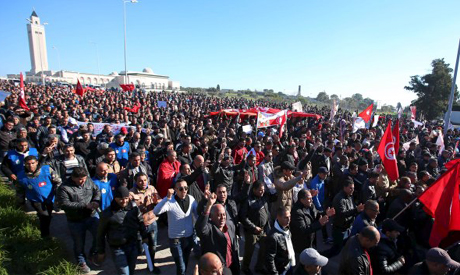
Tunisian police officers and security personnel shout slogans and hold flag during a protest in Tunis ,Tunisia 25 January 2016 (Photo: Reuters)
Several thousand Tunisian police marched in protest to the presidential palace on Monday to demand more pay in the latest pressure on Prime Minister Habib Essid's government after a week of riots over joblessness.
Tunisia's security forces are at the forefront of the country's war with Islamist militants, who have attacked army checkpoints and patrols, and launched major assaults on a tourist hotel a museum and the presidential guard last year.
Chanting "Wages still in the red", and "We defend the nation, we want our rights," police officers dressed in civilian clothes marched to the presidential palace in Carthage on the outskirts of the capital Tunis.
"We are looking to improve our situation like other sectors, especially as we are the frontline in defending the country," Chokri Hamada, a police union spokesman, told Reuters. "We don't have any trust in the government after all their promises."
Presidential guard blocked the road near the palace where around 3,000 police gathered in peaceful protest.
Tunisia's government is facing increasing challenges including a split within the ruling party Nidaa Tounes, a stubborn Islamist militancy, a weak economy and last week, an explosion of social tensions over jobs and opportunities.
Thousands of young men took to the streets in Kasserine after an unemployed man committed suicide last week when he was refused a job. That sparked rioting in several cities across the country until the government declared a nationwide curfew.
Tunisia has returned mostly to calm, but the protests underscored how vulnerable the North African country remains to social unrest despite the democratic transition it achieved five years after a revolt ousted autocrat Zine El-Abidine Ben Ali.
The government is already under pressure from international lenders to cut public spending and trim its budget deficit as part of economic reforms meant to bolster growth and jobs.
At least one policeman was killed in last week's protests, during which rioters burned police posts and stormed government buildings in more than five cities and towns in the worst unrest since the 2011 uprising against Ben Ali.
France, Tunisia's former colonial ruler, last week pledged 1 billion euros ($1.1 billion) over five years to help Tunisia deal with its transition to democracy.
Tunisia managed to avoid the violent after-shocks seen in other "Arab Spring" countries that toppled long-standing leaders in several Arab states. Its young democracy brought a new constitution, a political compromise between secular and Islamist parties and free elections.
But economic advances have not emerged and many Tunisians worry more about jobs, high costs and lack of opportunities. Unemployment stood at 15.3 percent in 2015, up from 12 percent in 2010, due to weak growth and lower investment.
Short link: